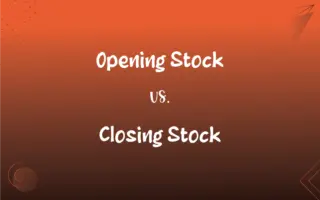Vocation vs. Occupation: What's the Difference?
Edited by Aimie Carlson || By Janet White || Published on January 14, 2024
Vocation is a person's calling or natural inclination toward a certain career or profession, while occupation is the job or profession someone is currently engaged in.

Key Differences
Vocation refers to a person's lifelong pursuit, often linked to their innate passion or calling. Occupation, on the other hand, denotes a person's current job or role, which may or may not align with their vocation.
Vocations are often seen as careers that fulfill a person’s intrinsic desires or talents. Occupations, however, can be any job, regardless of personal fulfillment or desire.
A vocation is sometimes associated with a sense of purpose or a higher calling in life. In contrast, an occupation is typically a means of earning a living and may not carry the same sense of personal mission.
Vocational choices are often influenced by personal values and life goals. Occupations can be chosen based on various factors such as market demand, salary, or convenience, often independent of personal passion.
People may pursue education or training aligned with their vocation, seeking deep expertise or mastery. Conversely, occupational skills might be acquired for practical reasons, such as job availability or economic necessity.
ADVERTISEMENT
Comparison Chart
Basis
Innate calling or passion
Current job or role
Fulfillment
Often aligned with personal fulfillment
May not necessarily offer fulfillment
Purpose
Linked to a sense of mission or purpose
Primarily a means of earning a living
Influence on Choice
Influenced by personal values and goals
Influenced by market demand, salary, etc.
Education/Training
Education aligned with personal passion
Skills often acquired for practicality
ADVERTISEMENT
Vocation and Occupation Definitions
Vocation
Life's work.
Writing became her vocation.
Occupation
Job.
His current occupation is a software engineer.
Vocation
Natural inclination.
Medicine was his vocation from a young age.
Occupation
Employment.
His occupation involves extensive travel.
Vocation
Calling.
He felt teaching was his vocation.
Occupation
Profession.
She entered the occupation of law after graduation.
Vocation
Personal mission.
Environmental activism is more than a job, it's my vocation.
Occupation
Role.
Working as a chef is his occupation.
Vocation
Passion-led career.
Her vocation as an artist started early in her childhood.
Occupation
Career.
She chose teaching as her occupation.
Vocation
A regular occupation, especially one for which a person is particularly suited or qualified.
Occupation
An activity that serves as one's regular source of livelihood; a vocation.
Vocation
An inclination or aptness for a certain kind of work
A vocation for medicine.
Occupation
An activity engaged in especially as a means of passing time; an avocation.
FAQs
What is an occupation?
An occupation is the job or profession in which a person is currently employed.
How do people discover their vocation?
Through self-exploration, experiences, and understanding personal strengths and interests.
Can a vocation change over time?
A vocation can evolve as a person's interests and life circumstances change.
Is occupation always chosen for financial reasons?
Often, but not always; some choose occupations that align with personal interests or values.
Is financial success a key aspect of occupation?
It can be, especially in professions chosen for income potential.
Can someone's occupation become their vocation?
Yes, if the occupation aligns with their intrinsic passions and interests.
Do all occupations require training?
Most do, whether formal education or on-the-job training.
Do vocations have societal value?
Yes, as they often involve contributions to areas of personal passion and expertise.
Does a vocation require formal education?
Not necessarily; a vocation can be pursued through various paths, including self-teaching or apprenticeships.
What defines a vocation?
A vocation is defined by a person's innate calling or deep passion for a particular field.
Is vocation always a professional pursuit?
Not always; it can also be an avocation or hobby that fulfills a person's passion.
Can occupation influence personal identity?
Yes, many people identify strongly with their professional roles.
Is it common to have multiple occupations?
Yes, especially in diverse and changing job markets.
Are occupations limited to traditional jobs?
No, they can include a wide range of roles, including unconventional or emerging fields.
Can one have a vocation without making it a career?
Yes, vocations can be pursued as hobbies or side interests.
Is job satisfaction more likely in a vocation?
Often, as it aligns with personal passions and values.
Is vocation linked to happiness?
Often, as it aligns with personal passions and interests.
Can a hobby turn into a vocation?
Yes, if it evolves into a deep, passionate pursuit.
Can vocational pursuits be financially rewarding?
Sometimes, especially if they align with market demands.
Is fulfillment a key aspect of vocation?
Yes, personal fulfillment is often central to a vocation.
About Author
Written by
Janet WhiteJanet White has been an esteemed writer and blogger for Difference Wiki. Holding a Master's degree in Science and Medical Journalism from the prestigious Boston University, she has consistently demonstrated her expertise and passion for her field. When she's not immersed in her work, Janet relishes her time exercising, delving into a good book, and cherishing moments with friends and family.
Edited by
Aimie CarlsonAimie Carlson, holding a master's degree in English literature, is a fervent English language enthusiast. She lends her writing talents to Difference Wiki, a prominent website that specializes in comparisons, offering readers insightful analyses that both captivate and inform.







































































